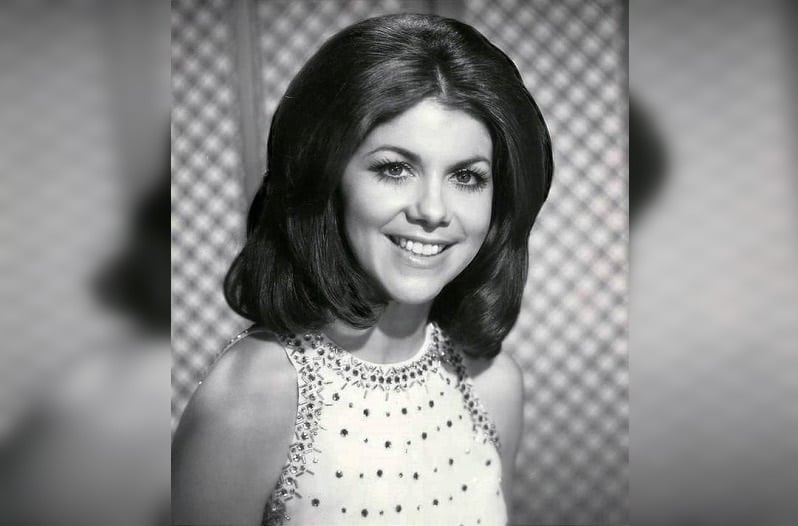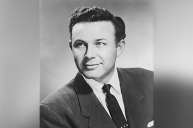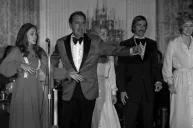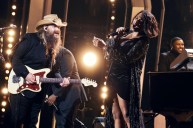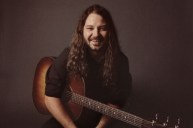Despite going on to cut some solid records in the '70s and beyond, Jody Miller is probably best known for two very different singles from the '60s —"King of the Road" parody "Queen of the House" and progressive folk song "Home of the Brave."
Born Myrna Joy Miller in Phoenix, Ariz., the future star was raised in Blanchard, Okla.—the same hometown as Bonnie Owens. While living in California and recording for Capitol Records, Miller found early career success with "He Walks Like a Man" (1964). The following year, a sarcastic send-up of Roger Miller—no relation—introduced the young folk and pop singer to a country audience. "Queen of the House" also netted a Nashville outsider the coveted Grammy Award for Best Female Country Vocal Performance.
Further country fame was around the corner, but not before the singer cut 1965's "Home of the Brave." Its biting critique of American society still rings as true as any folk revival standard. Oddly enough, it came from the pen of Barry Mann and Cynthia Weil, co-writers of The Drifters' "On Broadway," The Righteous Brothers' "You've Lost That Lovin' Feelin'" and other apolitical pop hits.
From there, she made a creatively solid yet fiscally disappointing Nashville-style album for Capitol before jumping to Epic Records, where producer Billy Sherrill carved her a more permanent niche in Music City. Country hits followed, including "There's a Party Goin' On" (1972), a cover of "House of the Rising Sun" (1973), a countrified take on Aretha Franklin's "(You Make Me Feel Like) A Natural Woman" (1974) and duets with Johnny Paycheck.
After spending part of the '80s in semi-retirement, Miller returned as an independent country and gospel artist. She's still very active as a live act and as the singing partner of her daughter Robin Brooks.
To further explore her career, Wide Open Country recently chatted with Miller about the origins of her two biggest hits and her unintentional rise as a country star.
WOC: Going back to the beginning of your career, you and your husband moved to Los Angeles from Oklahoma. Why did you choose Hollywood over Nashville?
Miller: I was singing folk music back in the early 1960s. I'd only been married about six months, and The Limeliters were playing the field house at the University of Oklahoma—where I was playing a little coffee house. They came in to hear one of their friends I was playing a set with. After I played my set, they complemented me. Their leader Lou Gottlieb was real enthusiastic. That was great of him, but I'd just gotten married. I was still in the glow of being married, and I was thinking about having children and all of that good stuff. I didn't pay much attention.
About a month passed, and I went back to work at that same old coffee house. The owner said I had a letter, and so I read it and it was from Lou. He said he'd discussed me with his agent, and his agent could get me a job if I went out to LA. So anyway, I thought this would be something very interesting to do. My husband and I were working jobs then, so we took off two weeks to go to LA and just investigate it. We ended up staying eight years.
One of your more obvious hits, "Home of the Brave," has a folk vibe to it despite being poppy...
I think that too, Bobby. No one else has ever said that, but it's true. I love that song.
How did you come across that song?
When I came to Capitol, I had a new producer there (Steve Douglas). He was a saxophone player who worked a lot for Phil Spector in his sessions. He knew Barry Mann and Cynthia Weil, the two writers that wrote all that good stuff. I went to New York. I guess I was doing something with the Jimmy Dean Show, and he introduced me to them and we had dinner with them. He mentioned that Phil Spector had done a recording of "Home of the Brave" with the girl singers. I can't remember the group, but they'd already recorded "Home of the Brave." What Steve my new producer did is he said we're going to cut it anyway. So he cut it on me, and Capitol released it.
It upset Phil Spector very much because he already had one in the can, and he was waiting for it to sell some records. It didn't sell any records. We sold more records of "Home of the Brave" than we did "Queen of the House," which was my really big song.
As you just mentioned, you parodied "King of the Road." How'd your other big hit come about?
"King of the Road" was such a big smash for Roger Miller. It was more than a hit record. His friend Mary Taylor, who was actually an artist signed to Capitol at the time, wrote the lyrics. She called him up on the phone one night and read him the lyrics. He said, "Mary, that's a hit. Why don't you cut it?" She said, "I can't cut it. I already have a song on the charts." You see, back then in the early '60s, if you had something on the charts, you didn't bother with putting another one on and another one on before the Beatles came along and showed us how it was done.
Her producer gave the song to my new producer Steve. He felt like he could throw him a bone because he just got started and he felt sorry for him, maybe. Anyway, he gave him the song, and I'd just flown in from Europe. He called me and asked me to come down to the tower that night to hear a song he thought would be a hit. I came in with my sister, and we went up to his office. He said, "The thing about it is, this is Roger's big smash. It's already loaded the airwaves. If we can come out with this as fast as we can, we can sell a lot of records." All he wanted to do was sell records, so that's what we did.
Did that song introduce you to a country audience?
Yeah, see, that thrust me into the country music business. To that point, I had not been interested at all in country music. I thought that "Queen of the House" was a good little number for Peggy Lee. She was on the Capitol label, too, and she'd had a record called "Fever" with finger snaps. "Queen of the House" had finger snaps, so I thought, "Well shoot, you're the jazz singer. Why don't you get this song to her?" Now I was happy to get it, especially once it started selling like it did. It really wasn't one of those beautiful songs like "Home of the Brave" that I could sink my teeth into. It's a simple little song—three chords on a guitar.
Did you transition to being more of a Nashville-style country singer after that?
What happened is Steve, my producer, being a saxophone player and Phil Spector mentor, was about as far away from country music as you could get. He tried to modernize some of the things we'd cut, like "Silver Threads and Golden Needles," with huge fiddles and an orchestra and things like that instead of having a three-chord, four-piece country band. We cut several country songs, but it didn't mean the DJs would play them. They saw right through us! We weren't country people. But it didn't matter because I got the Grammy.
By the '70s, you were in Nashville, cutting country records with Tammy Wynette's producer, Billy Sherrill...
He had me start singing pop songs with a country bag, like "He's So Fine," Baby I'm Yours" and "Will You Still Love Me Tomorrow?" We'd put a dobro and steel guitar and a bunch of guitars on it, and the public kind of liked it. They bought it.
Were the cover songs all the producer's choice?
He picked them. I wasn't a writer, so I couldn't do like Dolly and people like that and play the song I wrote yesterday that's going to be a hit tomorrow. I had to wait until someone brought me some songs. That's not a very good game to play. It's not successful, either. My producer had this idea of using those girl trio songs and putting them in a country bag, so to speak. So Billy did all of the picking, really.
You now play music with your daughter and grandson. Did your daughter take to singing at a young age?
Oh yeah, she's been playing guitar all of her life and singing. She went to university and got her music degree. She's happily married now, has two children, is a vocal coach and also teaches guitar and piano. She and I sing together. Our grandson plays classical piano, and he's great. He's a composer, and he produced the new single we have out. It's called "Where My Picture Hangs on the Wall."
Did you have any trepidation about your family getting involved with music, just from your own experiences? Or were you excited to see them chase a shared passion?
Well, I believe in them. I believe they have tremendous talent, so I'd like to see them go as far as they can with what they have.
In the '90s, you became a Christian and started focusing on gospel material...
Yeah, I cut my own stuff. I produced my own CDs and did my own recordings. It was quite a job.
There's a good many country singers in your age range, like Donna Stoneman, Jeannie C. Riley and Connie Smith, who'd go on to do gospel music, too. Beyond the faith you all share, do you think a classic country singer's skill set just lends itself to gospel?
I have always wanted to do all genres of music. I did a complete album of patriotic songs. Once you're released from a label, you're sort of free to do whatever you want to do. I just felt compelled to do gospel. I loved it, I had some good ideas and I sold a lot of records.
You mentioned your patriotic record, 1987's My Country. If I understand right, you got to meet George H.W. Bush out of that and sing at his inauguration. How'd you end up connected to the Bush family?
What happened is I cut that patriotic tape. Back then, we were doing cassette tapes. I said I wanted to do some patriotic music, and people said I was crazy because it doesn't sell. They were right. It doesn't. Still, what happened is this cassette found its way into the hands of the George Bush campaign people. They called me on the phone and asked me I'd sing at a few stops with George, so I did. I went out and did a few stops with him. I never did tell him I was a Democrat. It didn't matter, I guess. When it came time for the inauguration, I sang at one of the balls. We really enjoyed that.
I guess that beats selling 2,000 cassette tapes.
Yeah, it's something to put on your resume, I guarantee you. Especially that man... He was the nicest guy I ever met and a hard worker, too.
